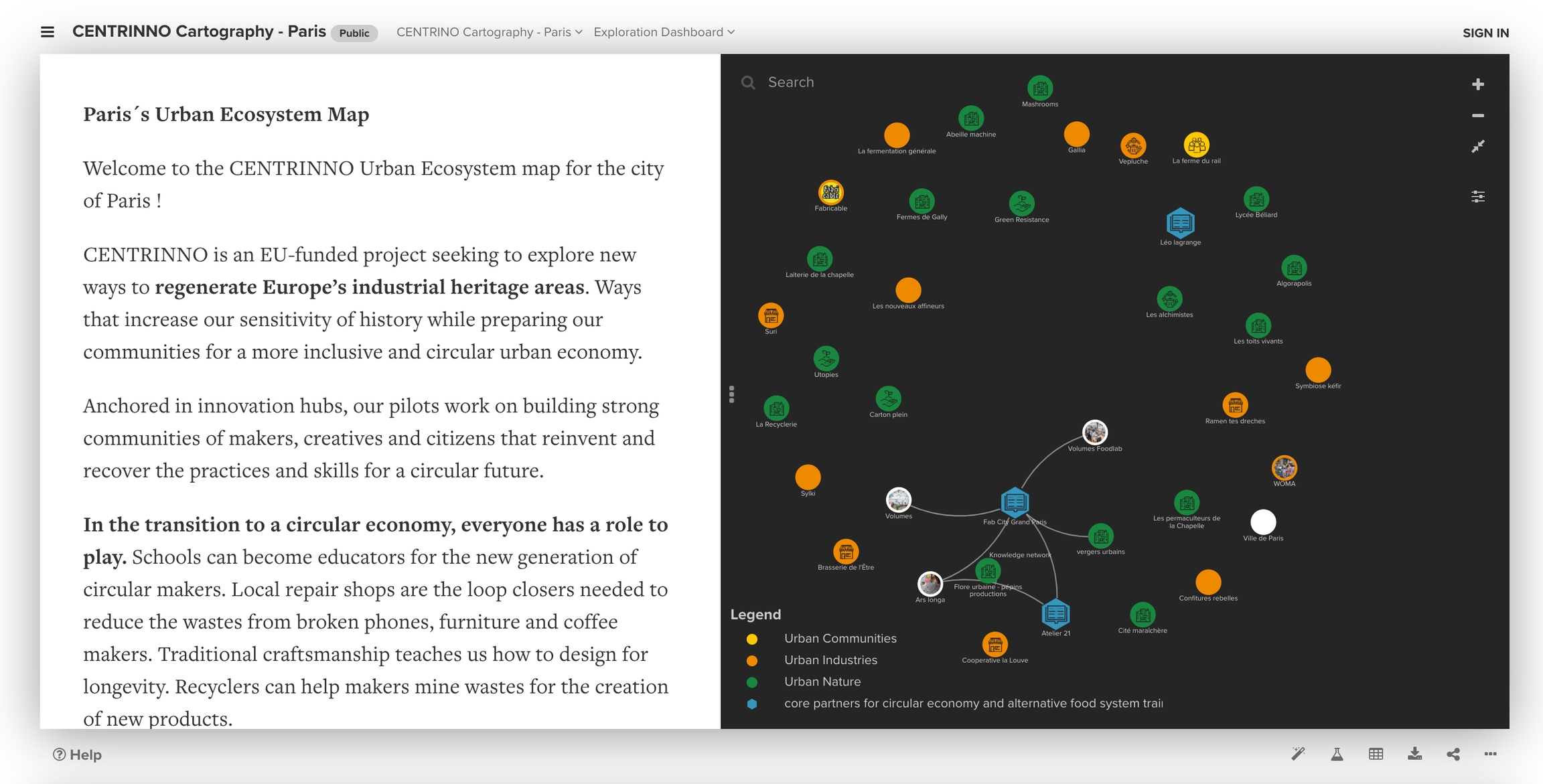🏭Kumu for learning ecosystems
An open source mapping to turn your Hub into a Learning Ecosystem a case study from Paris FCH Team.
What is this tool about and why is it relevant ?
The 9 Fab City Hubs during the CENTRINNO project, tested an open source mapping tool called KUMU that allow them to map and collect data about urban ecosystems and anchor FCHs into local dynamics and networks.
The team in Paris required a comprehensive understanding of the skill sets present among the members of the Fab City Grand Paris network. This insight was crucial for formulating a vocational training program aligned with the available resources, encompassing both human expertise and knowledge.
Fab City Grand Paris seeks to be a collaborative network for local production but encountered challenges in assessing the diverse skills and knowledge within its extensive and dispersed membership.
To bolster its role as an active learning ecosystem Fab City Grand Paris, decided to develop Kumu as a tool to identify, quantify, and localize the skills, resources, and actors within its network's members . This includes responding to specific vocational training requests, providing expertise or spaces for specific needs, and collaborating on calls for proposals involving multidisciplinary actors.
Check the work the Paris FCH team has developed during CENTRINNO focusing on mapping practices in their specific page of the CENTRINNO Cartography platform
Local Outcomes 👍
The setting up and implementation of Kumu as a open mapping tool for set up a learning ecosystems allowed the local team in Paris to obtain the following:
→ provide a general overview of available skills and resources held within the parisian network of food producers and makers and thus to answer to different needs related to educational and training purposes
→ become the digital tool that will support the implementation of physical FCH as a distributed learning ecosystem
→ potentially it could foster the creation of business opportunities for training or distributed production
→ support key partnership for multidisciplinary collaborations and distributed production such as the Makers-covid Initiative
Organisational Practices
The use of this tool within the Parisian team and their journey toward FCH contributed to the following changes in organisational practices each of them related to some of the three foundational aspects of a FCH: Vision , Community and Infrastructure.
OP N. 1- Activating interactions and facilitating connections and collaborations among the different actors active in urban environments.
OP N. 2- Access and connection to information, communities, projects and initiatives related to the local distributed creative and productive ecosystems.
OP N. 3- Embracing emergence of new needs, projects, and organisations through open and resilient structures amidst rapidly changing and hazardous environments.
OP N. 4- Engaging with and creating new institutions through experimentation and prototyping of diverse assemblages of actors and functions.
OP N. 9 - Create awareness around convivial forms of innovation, manufacturing capabilities, creative citizenship and social connections.
OP N. 10 - Multi-layered coordination combining physical spaces and facilities, with digital communication for diverse communities.
Key Steps
Find here a list of fundamental steps shared by the Paris team you should follow if you want to use a mapping tool for building a FCH as distributed learning ecosystem.
Summary Table
| Characteristics | |
|---|---|
Purpose | To map the actors of alternative food systems and their potential ( skills, knowledge and spaces ) to support the creation of a learning ecosystem |
Difficulty | Medium |
Duration | do not apply |
Facilitator I Participants | F= 1-2 I P= 10-50 |
Setting | Online |
Contact | FabCity Grand Paris , hello@fabcity.paris |
Tagging System | #BuildFCHasLearningEcosystem, #MapTheEcosystem, #VocationalTraining, #Circularity |
Do you want to learn more ?
Here some useful links that you can look at if you want to better understand what Paris is doing to set up their Fab City Hub as a learning ecosystem :
→ Kumu Paris Page the kumu main pages Paris team is developing
Find here after 3 different formats of vocational training courses taught in the Parisian FCH and the other spaces of the ecosystem :
→ Agriculture XYZ - an example of training course that actors from the local network could organise related to local food production
→ Circular Making - A training program bridging technology, craftsmanship, and eco-design, aimed at preparing future professionals for careers in advanced digital fabrication and circular economy
→ Résiliences Productives - an example of integrated training programme that proposes an holistic approach to resilient production to unemployed people
Last updated


